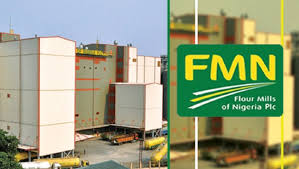Flour Mills of Nigeria Plc (FMN) has restated its commitment to supporting food security in Nigeria and driving local content development through sustained investments in agriculture and agro-allied industries.
The Group, which is one of Nigeria’s largest food and agro-allied companies, said in a statement that its long-standing agenda, “Feeding the Nation Every Day,” remains central to its 65-year strategy of reducing the country’s dependence on imported raw materials.
The Group Chief Executive Officer, Mr. Boye Olusanya, explained that FMN has evolved into more than just a business entity, describing it as a strong ally in Nigeria’s growth and development. He noted that the company continues to contribute significantly to the country’s economy by providing jobs, empowering farmers, and investing in local production.
“For over six decades, the Group has been a source of livelihood for millions of Nigerian families by providing both direct and indirect employment. And more than any other business in the country, we have guarded our national heritage with trust, ensuring that our activities are sustainable for the country, the environment, and most importantly, for the people,” Olusanya said.
FMN highlighted that its agricultural journey started in 1978 when it acquired a 10,000-hectare farm in Kaboji, Niger State, as part of an expansion strategy to strengthen the sugar supply chain and reduce Nigeria’s reliance on imported sugar. That decision marked the beginning of a long-term investment drive into diverse agricultural value chains across the country.
Since then, the company has invested in the cultivation of a wide range of crops including soya beans, palm fruits, cassava, wheat, maize, sugarcane, and sorghum. Beyond cultivation, FMN has also expanded into the aggregation, processing, and distribution of locally sourced grains, which are then used to produce its food products under the popular Golden Penny brand.
The Group said one of its major contributions to agricultural development is the transformative outgrower programme, which is complemented by agronomy support systems. Through this initiative, FMN has empowered more than 400,000 farmers across Nigeria by giving them access to quality seeds, inputs, training on best practices, and a reliable market for their harvests. These farmers form a critical part of FMN’s supply chain, ensuring that its food brands are produced using locally sourced raw materials.
In addition, FMN disclosed that Golden Agri Inputs Limited, a subsidiary under FMN Agro Ltd, has developed structured farming schemes for over 50,000 farmers across different parts of the country. The company said the schemes have been designed to improve productivity through the introduction of high-yielding hybrid crop varieties, advanced agronomy practices, storage solutions, and guaranteed market access. The crops covered under these schemes include maize, sorghum, cassava, wheat, soya bean, and palm kernel.
Olusanya reiterated that FMN’s focus remains on supporting local content development and achieving food self-sufficiency in Nigeria. He added that the company is also looking at progressively extending its impact across Africa by strengthening regional food systems.
“FMN remains unwaveringly committed to local content development for the attainment of food self-sufficiency in Nigeria and progressively across the continent,” he said.
Industry analysts have observed that FMN’s model of combining large-scale farming with smallholder farmer empowerment has helped reduce the risks of overdependence on imports, especially during times of global supply chain disruption. With Nigeria facing challenges in food production and inflation, experts say such long-term investments are critical to stabilising the nation’s food economy.
The company’s “Feeding the Nation Every Day” agenda is also seen as a strategic alignment with the Federal Government’s push for agricultural transformation and self-reliance in food production. By providing jobs, building capacity, and strengthening local agricultural value chains, FMN continues to play a vital role in Nigeria’s drive for food security.
For many rural communities, FMN’s initiatives have provided steady income and helped reduce poverty levels, particularly among smallholder farmers. Its consistent investment in agriculture also aligns with Nigeria’s broader goals of diversifying the economy away from oil dependence and promoting sustainable growth through agribusiness.
